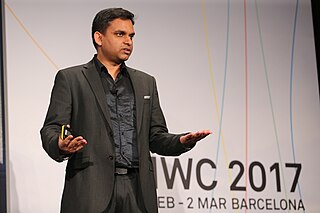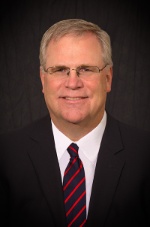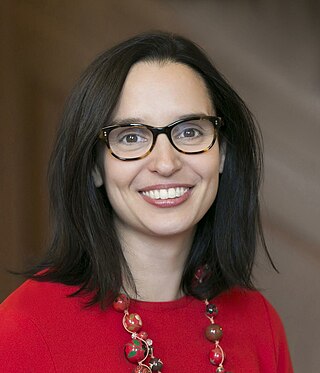Related Research Articles
A startup or start-up is a company or project undertaken by an entrepreneur to seek, develop, and validate a scalable business model. While entrepreneurship includes all new businesses, including self-employment and businesses that do not intend to go public, startups are new businesses that intend to grow large beyond the solo founder. At the beginning, startups face high uncertainty and have high rates of failure, but a minority of them do go on to be successful and influential.

A business model describes how an organization creates, delivers, and captures value, in economic, social, cultural or other contexts. The process of business model construction and modification is also called business model innovation and forms a part of business strategy.

Innovation is the practical implementation of ideas that result in the introduction of new goods or services or improvement in offering goods or services. ISO TC 279 in the standard ISO 56000:2020 defines innovation as "a new or changed entity realizing or redistributing value". Others have different definitions; a common element in the definitions is a focus on newness, improvement, and spread of ideas or technologies.

Michael Eugene Porter is an American academic known for his theories on economics, business strategy, and social causes. He is the Bishop William Lawrence University Professor at Harvard Business School, and he was one of the founders of the consulting firm The Monitor Group and FSG, a social impact consultancy. He is credited for creating Porter's five forces analysis, which is instrumental in business strategy development at present. He is generally regarded and hailed as the father of the modern strategy field. He is also regarded as one of the world's most influential thinkers on management and competitiveness as well as one of the most influential business strategists the world has ever seen. His work has been recognized by governments, non governmental organizations and universities.
Human resource management is the strategic and coherent approach to the effective and efficient management of people in a company or organization such that they help their business gain a competitive advantage. It is designed to maximize employee performance in service of an employer's strategic objectives. Human resource management is primarily concerned with the management of people within organizations, focusing on policies and systems. HR departments are responsible for overseeing employee-benefits design, employee recruitment, training and development, performance appraisal, and reward management, such as managing pay and employee-benefits systems. HR also concerns itself with organizational change and industrial relations, or the balancing of organizational practices with requirements arising from collective bargaining and governmental laws.
Social responsibility is an ethical framework in which an individual is obligated to work and cooperate with other individuals and organizations for the benefit of the community that will inherit the world that individual leaves behind.
Founder's syndrome is the difficulty faced by organizations, and in particular young companies such as start-ups, where one or more founders maintain disproportionate power and influence following the effective initial establishment of the organization, leading to a wide range of problems. The syndrome occurs in both non-profit and for-profit organizations or companies.
Intrapreneurship is the act of behaving like an entrepreneur while working within a large organization. Intrapreneurship is known as the practice of a corporate management style that integrates risk-taking and innovation approaches, as well as the reward and motivational techniques, that are more traditionally thought of as being the province of entrepreneurship. Corporate entrepreneurship is a more general term referring to entrepreneurial actions taking place within an existing organization whereas Intrapreneurship refers to individual activities and behaviors.
Change management is a collective term for all approaches to prepare, support, and help individuals, teams, and organizations in making organizational change. It includes methods that redirect or redefine the use of resources, business process, budget allocations, or other modes of operation that significantly change a company or organization.

Harvard Business School (HBS) is the graduate business school of Harvard University, a private research university in Boston, Massachusetts. It is consistently ranked among the top business schools in the world and offers a large full-time MBA program, management-related doctoral programs, and many executive education programs. It owns Harvard Business Publishing, which publishes business books, leadership articles, case studies, and the monthly Harvard Business Review. It is also home to the Baker Library/Bloomberg Center.

Rita Gunther McGrath is an American strategic management scholar and professor of management at the Columbia Business School. She is known for her work on strategy, innovation, and entrepreneurship, including the development of discovery-driven planning.

Soumodip Sarkar is an economist and management scholar.

Tomas Chamorro-Premuzic is an organizational psychologist who works mostly in the areas of personality profiling, people analytics, talent identification, the interface between human and artificial intelligence, and leadership development. He is currently a professor of business psychology at University College London (UCL) and an adjunct professor at Columbia University, as well as the Chief Talent Scientist at ManpowerGroup, and was previously the CEO at Hogan Assessment Systems.

Marie Kondo, also known as Konmari (こんまり), is a Japanese organizing consultant, author, and TV presenter.

Kathleen Sutcliffe is a Bloomberg Distinguished Professor of Medicine and Business at the Johns Hopkins University Carey Business School and School of Medicine and the Gilbert and Ruth Whitaker Professor Emerita of Business Administration at the University of Michigan Ross School of Business. She studies high-reliability organizations and group decision making in order to understand how organizations and their members cope with uncertainty and unexpected events, with a focus on reliability, resilience, and safety in health care.

Sangeet Paul Choudary is a business executive, advisor, and best-selling author. He is best known for his work on platform economics and network effects. He is the co-author of the international best-selling book Platform Revolution: How Networked Markets Are Transforming the Economy and How to Make Them Work for You.

Jay B. Barney is an American professor in strategic management at the University of Utah.

Julie Battilana is a scholar, educator, and advisor in the areas of social innovation and social change at Harvard University. She is the Joseph C. Wilson Professor of Business Administration at Harvard Business School and the Alan L. Gleitsman Professor of Social Innovation at the Harvard Kennedy School.

Leonard A. (Len) Schlesinger is an American author, educator, and business leader. He is currently the Baker Foundation Professor at Harvard Business School and President Emeritus of Babson College where he served as the college's 12th President from 2008 through 2013.

Tidying Up with Marie Kondo is a reality television series developed for Netflix and released on January 1, 2019. The show follows Marie Kondo, a Japanese organizing consultant and creator of the KonMari method, as she visits families to help them organize and tidy their homes. Marie Iida acts as Marie Kondo's interpreter throughout the show.
References
- ↑ Sonenshein, Scott (2016-04-07). "Rice.edu". Rice University. Retrieved 6 December 2016.
- ↑ Sonenshein, Scott. "Competition Never Tasted So Good". Rice Business Wisdom. Rice. Retrieved 6 December 2016.
- ↑ Green, Penelope (2019-01-02). "Marie Kondo Now Has a Reality Show: Netflix's 'Tidying Up'". The New York Times. ISSN 0362-4331 . Retrieved 2019-03-31.
- ↑ "Our PHD Program". Michigan Ross. Retrieved 6 December 2016.
- ↑ [bizstanding.com/p/vividence-48132577 "Vividence"]. bizstanding.com. BizStanding. Retrieved 6 December 2016.
{{cite web}}: Check|url=value (help) - ↑ "Keynote to Acquire Vividence Corporation, the Leader in Web-Based Customer Research". Business Wire. Business Wire. 2004-09-10. Retrieved 6 December 2016.
- ↑ Sonenshein, Scott. "Stretch - Scott Sonenshein - Hardcover". HarperCollins US. Retrieved 2016-12-24.
- ↑ "10 books on leadership to read in 2017". Washington Post. Retrieved 2016-12-24.
- ↑ Sonenshein, Scott (2017-05-17). "To Raise Better Kids, Say No". The New York Times. ISSN 0362-4331 . Retrieved 2019-03-31.
- ↑ "The Key to Success Is Not Having More". Time. Retrieved 2019-03-31.
- ↑ Sonenshein, Scott (2016-04-13). "Why your Idea of Success May Be Making You Miserable". Fast Company. Fast Company. Retrieved 6 December 2016.
- ↑ Sonenshein, Scott (2017-02-06). "What to Do When Your Boss Says No". Harvard Business Review. ISSN 0017-8012 . Retrieved 2019-03-31.
- ↑ Sonenshein, Scott (July 2015). "For Founders, Preparation Trumps Passion". Harvard Business Review. Harvard Business Review. Retrieved 6 December 2016.
- ↑ Sonenshein, Scott (2017-03-02). "Three reasons why budget cuts could help (not hurt) America". Fox News. Retrieved 2019-03-31.
- ↑ Medium, Scott Sonenshein (2016-12-06). "'Tis the Season to Give More with Less". medium.com. Retrieved 2019-03-31.
- ↑ Brown, Corie (2015-08-26). "Don't Beat 'Em, Join 'Em: Why Brewing Together Works Better in the Craft Beer Industry". Entrepreneur. Entrepreneur. Retrieved 6 December 2016.
- ↑ Mouawad, Jay (2010-05-02). "United and Continental Said to Agree to Merge". The New York Times. Retrieved 6 December 2016.
- ↑ Sonenshein, Scott. "Quotes of the Day". time.com. TIME. Retrieved 6 December 2016.